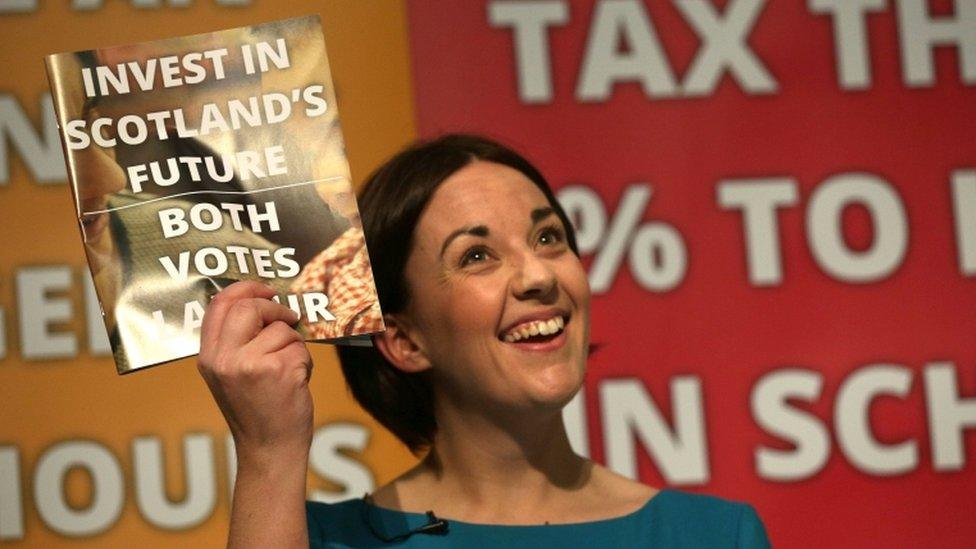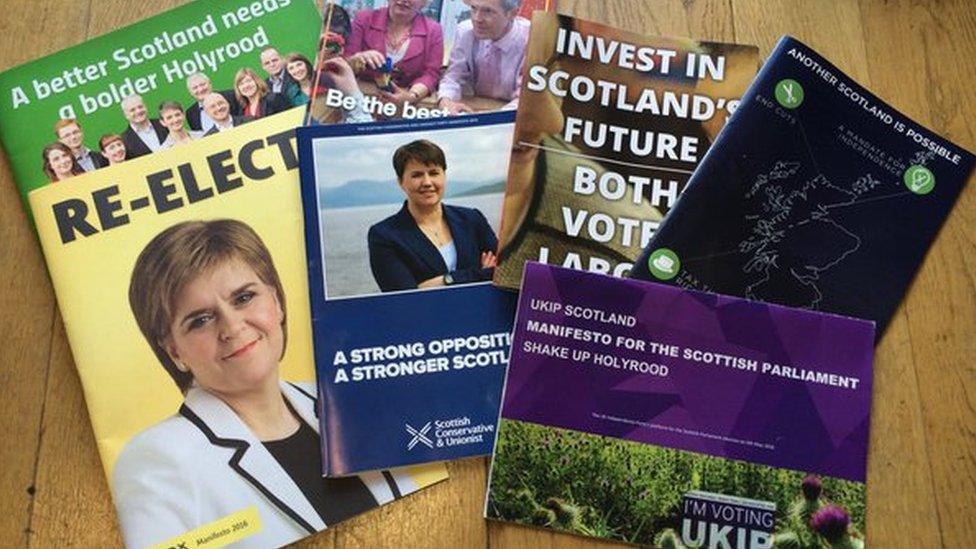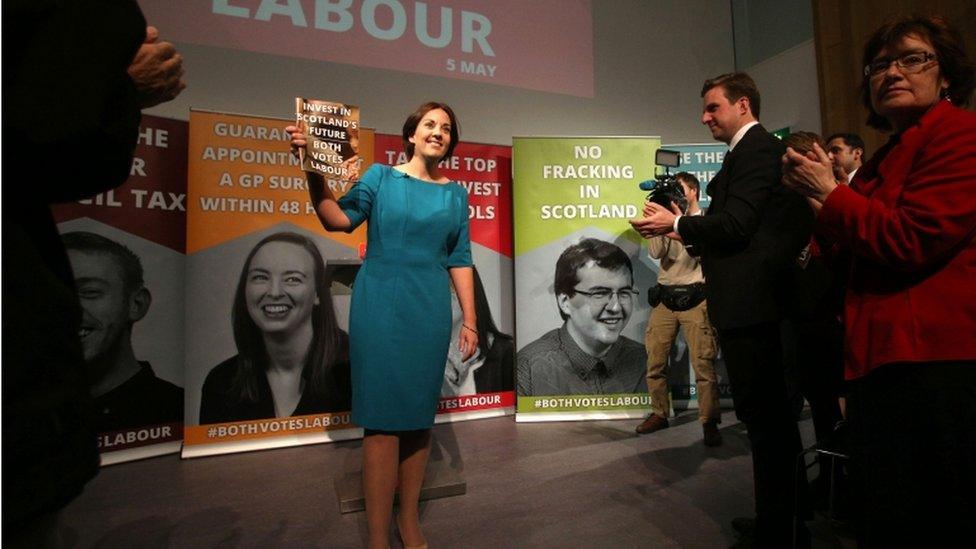Holyrood 2016: Scottish Labour manifesto pledges 'return to party's roots'
- Published

Ms Dugdale launched the manifesto at an event in Edinburgh
Scottish Labour has described its manifesto for the Holyrood election as being a "return to the party's roots".
The manifesto opposes renewal of the Trident nuclear weapon system - subject to all existing jobs being retained - and fracking.
It also sets out Labour's opposition to a second independence referendum for the duration of the next parliament.
And it makes an anti-austerity pledge to stop cuts by increasing spending on public services in real terms.
The document was unveiled by Scottish Labour leader Kezia Dugdale in Edinburgh with just a week of campaigning left before the election on 5 May.
'Alternative to austerity'
It promises real terms protection of health, education, policing and culture budgets.
And it proposes raising money to pay for public services by increasing income tax by 1% across all bands and increasing the top rate for those earning more than £150,000 from 45p to 50p.
Ms Dugdale insisted Labour was the "only party offering an alternative to austerity" as she set out plans to use the powers of the Scottish Parliament to "invest in the future and stop the cuts to public services".
She has pledged to put education at the heart of her party's proposals for government, which include funding for a breakfast club in every primary school and an after-school sports "revolution" for every secondary school.
The breakfast clubs policy could see an average investment of £6,500 at every school. Ms Dugdale said it could help grow the economy and help women in particular thrive in their jobs.
Further pledges for children in the manifesto include a "fair start fund" of £1,000 for every child from a deprived background to cut the attainment gap between "the richest and the rest" in classrooms, funding for primary school teachers to go on computer coding courses and scrapping charges for exam appeals.

Analysis by Brian Taylor, BBC Scotland political editor
What to discern from all this? That Labour perceives it has a problem with definition in the minds of the Scottish public, that voters wonder - or, rather, have been wondering - what Labour stands for, that Labour knows it needs to remedy that, for the immediate election and - should they fail to win this time - for subsequent contests.
To be clear, Ms Dugdale is pressing for every single vote. Like the SNP, she wants the electorate to back her party on both the constituency and list ballot papers.
Should that accumulate into overall victory, Ms Dugdale would be more than delighted to move into Houses, Bute and St Andrew's.
And if it does not? If Labour falls short? The manifesto launch then kicks into alternative mode - which involves two facets.
One, Labour hopes that with its offer on tax and education, it has more firmly established its political credentials in the public mind.
Two, Labour hopes that it may have set a series of traps which could snap shut upon the SNP government during the coming term.

Speaking at the launch, Ms Dugdale said: "This is a manifesto in the best traditions of the Labour Party. This plan for a Labour government is Labour at our boldest best.
"It is the return of the Labour Party that gave us the NHS, the minimum wage, the Labour Party that established the Scottish Parliament.
"It is a positive plan that returns to Labour's roots and invests in our nation's future. Our manifesto isn't about the politician on the front cover. Our manifesto is about the people of Scotland.
"It is about the powers that Scotland holds. It is about the potential of our nation."

All of Scotland's main political parties have now launched their manifestos
Opinion polls have suggested Labour is facing a battle for second place with the Conservatives, while the SNP appears to be on course for a second successive majority and a third consecutive term in government.
To help pay for the extra measures outlined in its manifesto as it seeks to put clear water between itself and the other parties, Labour has proposed a number of tax reforms.
Ms Dugdale opposes George Osborne's rise in the threshold for the 40p income tax rate, and wants to increase the top rate to 50p for those earning more than £150,000 and to add 1p to all other income tax bands.
She also wants to abolish the current system of council tax, replacing it with a new property-based levy including a revaluation of property prices across Scotland.
The party has argued that 80% of people would pay less under its proposals than they currently do through the council tax.
Labour would also seek to empower local government by devolving tax-raising powers such as a tourism tax, land value tax and a surplus from the Crown Estate.
Health service
On the NHS, Labour wants to protect the health service budget in real terms, guarantee an appointment at a GP surgery within 48 hours, provide increased university places for medical students and invest more in advanced nurse practitioners.
The party has also set a target of having 60,000 new homes built across the next parliament, including 45,000 for social rent, alongside a plan to help first-time buyers get on the property ladder.
On Trident renewal - which was supported by Ms Dugdale but opposed by Scottish Labour as a whole at its conference - the manifesto says it will "make a submission to the UK party's national defence review opposing the renewal of Trident, subject to defence diversification agency guaranteeing the retention of all existing jobs."
And on the issue of independence, Ms Dugdale said it was time to "move on from the arguments of the past" and instead use the new powers coming to the Scottish Parliament to "make different decisions and act in the best interests of the people of Scotland".
Ms Dugdale said her party's opposition to a second independence referendum was "unequivocal" and that it was a "myth" that independence was the only way to change things".
She also said she was "appalled" that the SNP seemed unwilling to use Holyrood's new powers.
- Published27 April 2016

- Published27 April 2016
